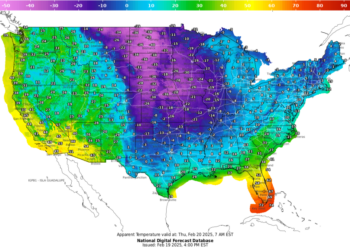
Haitians in Ohio fear for safety after Trump’s false claims
Haitians living in Springfield, Ohio say they’re on edge after Republican Vice President nominee JD Vance amplified false claims about immigrants there.
“In Springfield, they’re eating the dogs. The people that came in. They’re eating the cats. They’re eating — they’re eating the pets of the people that live there.”
Those words by former President Donald Trump during the presidential debate with Vice President Kamala Harris were a jarring lowlight for Trump in a televised faceoff that most political observers said Harris won decisively.
It was also a continuation of a racist attack against the Haitian residents of Springfield, Ohio — based on a false media post on Facebook, since deleted — championed by his running mate, JD Vance, which has resulted in at least 30 bomb threats against the city, schools and businesses closing in fear, and white supremacists showing up to protest.
The ripple effect of that fear does not appear to have spread to New Jersey.
Immigrants in this state who are eligible to vote on Election Day say politicians using baseless rumors to gin up attacks on their groups only motivates them more to cast their votes.
“No change has ever been generated or created without action, and the first step of action is to use our most inalienable right, which is to vote,” East Orange Councilman Bergson Leneus, who is Haitian American, said in a press conference there this month at which city officials, representatives of the National Haitian American Elected Officials Network and other community leaders lashed out at Trump and Vance while calling for people to express their displeasure at the ballot box in November.
“We must use that vote this November,” he said.
Both Republican candidates Trump and Vance have focused on the Haitians in Springfield, claiming they are eating pets, in an effort to amplify their criticisms about how the Biden administration has dealt with migrants coming over the U.S. southern border. Vance, who represents the city as a U.S. senator, admitted in an interview this month on CNN that he was using false claims about Haitians to bring attention to the criticisms.
“If I have to create stories so that the American media actually pays attention to the suffering of the American people, then that’s what I’m going to do,” Vance said to Dana Bash, the host of CNN’s “State of the Union.”
The Trump-Vance campaign’s targeting of Haitians continues its anti-immigration stance, which has been evident in Trump’s vowing on the election trail to conduct mass deportations of 11 million undocumented immigrants that would start in Springfield, Ohio, and Aurora, Colorado. Aurora has been the subject of right-wing rumors that an apartment complex was taken over by Venezuelan gangs.
The Garden State, where Trump resides several months of the year in Bedminster at the Trump National Golf Club, which he bought in 2002, is home to more than 70,000 Haitians. Overall, more than 23% of the state’s population are immigrants.
Fear or voting on Election Day
Kaitlin Sidorsky, an associate professor of political science and public policy at Ramapo College, said there was “disbelief and confusion” when she saw the debate, at a watch party with students on campus, and Trump spewed out the comments about the eating of pets. Neither she nor the students knew about the attacks on Springfield Haitians.
“A good number of my students went to that debate watch party, so they were able to discuss it in class,” Sidorsky said. “They just didn’t understand why [Trump and Vance] were pushing this narrative so hard when it’s very clear that both the local and community leaders as well as the Republican governor of Ohio have said it was false. But they keep pushing the narrative, so it keeps getting attention.”
New Jersey is home to about 1.2 million naturalized citizens, according to the American Immigration Council. They are citizens who will have the opportunity to vote on Election Day. Newly naturalized citizens who settle in New Jersey, according to the report “New American Voters in New Jersey,” come from various origins, with about 44% from South and Central America, 36% from Asia, 11% from Europe, and 9% from the African continent.
Sidorsky said the ripple effects of the racist accusations against Haitians in Ohio could also be felt by people who are not Haitian. And that could translate into more naturalized citizens from various ethnic groups in New Jersey getting out to vote rather than staying away.
“This kind of language and rhetoric may make them more likely to vote because they feel like they are targeted,” Sidorsky said. “I would err on the side of more enthusiasm for voting as opposed to being more afraid.”
She pointed out that New Jersey’s diversity also plays a role.
“When you live in a more diverse area … I think that helps a little bit in terms of decreasing the fear of voting,” Sidorsky said. “Having networks out there like the Haitian elected officials network helps to get people motivated and help them not be afraid.”
She continued, “Also, in New Jersey, there’s probably stronger and better voter protection laws and encouraging of voting in New Jersey as opposed to other places.”
The campaign of racist remarks and rhetoric toward the Haitian community in Springfield is a continuation of the same toward various ethnic groups by politicians in history, said Amber Reed, the co-executive director of AAPI New Jersey, which began as AAPI Montclair in 2021, a nonprofit group formed to deal with anti-Asian hate.
“This flows into a tidal wave of anti-immigrant rhetoric that we have experienced not only during this election, but for years and years,” Reed said. “We have seen scapegoating of nonwhite people, particularly recent immigrants. Fearmongering over things like Chinese crossing the border from Mexico and Indians crossing over the northern border.”
Reed, whose organization has been registering Asian American voters during this election season in Bergen, Hudson and Middlesex County, agreed with Sidorsky that New Jersey has pretty strong laws against voter intimidation that would encourage new citizens to vote. But while she cautions immigrant groups to stay alert during these times, she is hopeful they will not stay away on Election Day.
“I think it’s on all our communities to be vigilant right now and to really think about the risks that we face as people of color during a time of really heated xenophobic rhetoric,” Reed said. “But I don’t think it’s enough to keep us away.”
Ricardo Kaulessar covers race, immigration, and culture for NorthJersey.com. For unlimited access to the most important news from your local community, please subscribe or activate your digital account today.
Email: [email protected]
Twitter/X: @ricardokaul
Source link : http://www.bing.com/news/apiclick.aspx?ref=FexRss&aid=&tid=66f28fd1b7d9458fa284e66518423c6f&url=https%3A%2F%2Fwww.usatoday.com%2Fstory%2Fnews%2Fpolitics%2Felections%2F2024%2F09%2F24%2Fhaitians-springfield-ohio-racism-nj-election-2024%2F75263966007%2F&c=11714874354958325046&mkt=en-us
Author :
Publish date : 2024-09-23 21:28:00
Copyright for syndicated content belongs to the linked Source.






